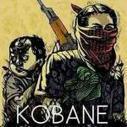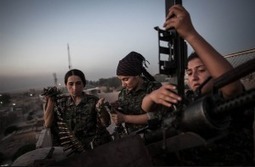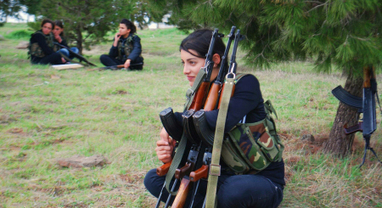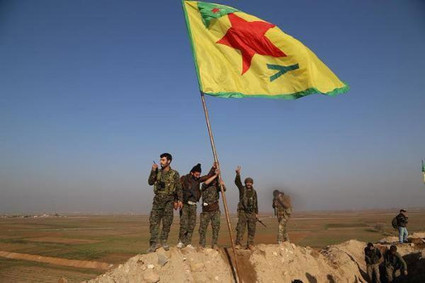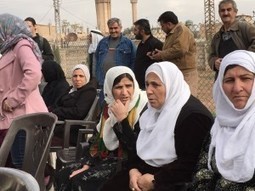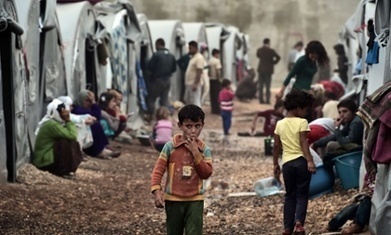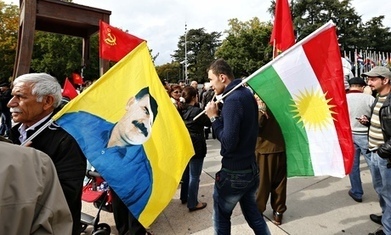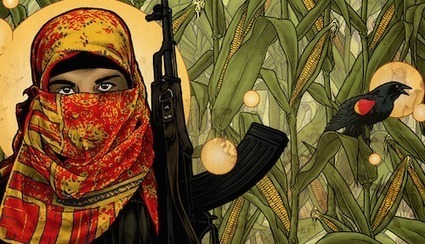 Your new post is loading...

|
Scooped by
jean lievens
July 4, 2015 1:02 PM
|
I recently had the opportunity to visit Turkey and North Kurdistan. In that short time, Istanbul celebrated the third year anniversary of Gezi Park, the Democratic Union Party (HDP) won unprecedented political representation in the Turkish parliament, and the cantons of Cizire and Kobane were joined. Throughout these dramatic events, I was often sitting cross-legged on living room floors, drinking tea and listening to the stories of journalists, activists, and families who had participated in the Rojava Revolution. Such conversations were made possible through many comrades, most of all through Jihad Hemmi, who acted as a guide, translator, and intellectual companion. Through my travels, I was given a glimpse of the relation between the Kurdish freedom movement and the philosophy of social ecology. By the same token, I gained a much clearer sense of the extraordinary scope and meaning of this particular revolutionary struggle.

|
Scooped by
jean lievens
March 7, 2015 6:29 PM
|
“At mid-afternoon on 15 September 2014, the foreign minister of Kobane, Omer Mus, received a call from a UN official stating that Turkey was prepared to take in 40,000 refugees crossing the border from Kobane. Hours later, ISIS began attacking the city from all three sides and the YPG and YPJ forces began a massive evacuation of tens of thousands of villagers. Those that remained took part in a historic defence of their city, which, had it not been successful, could have had disastrous consequences for the people of the region.

|
Scooped by
jean lievens
March 3, 2015 2:05 PM
|
After approximately four and a half months of fighting, Kurdish forces have successfully pushed the Islamic State of Iraq and the Levant (known as ISIS or ISIL) out of Kobanî. The coalition of ground forces most notably included the People’s Defense Units (YPG) , Women’s Defense Units (YPJ) , and the Peshmerga from the Kurdish Regional Government (KRG).At the same time, through the air, a U.S. led-coalition made 700 airstrikes against ISIS. On February 6 it was reported “fourteen more villages and some strategically important points have been liberated.” In an October 2014 article for Naked Capitalism Claude Salhani noted the strategic importance of the region. Salhani stated “victory for” ISIS in the region “would give the group prestige among the dozens of groups lined up in the fight against Syrian President Bashar Assad. It would also secure the terror organization’s flow of oil to a lucrative market.”

|
Scooped by
jean lievens
February 28, 2015 2:02 PM
|
by Michael Knapp, Historian; Translated from German original by Richard Braude The revolution in Rojava (West Kurdistan/ North Syria), which started in Kobanî (Ain al-Arab) and spread like wildfire through Afrîn, Dêrik (Al-Malikiya), Qamişlo (Al-Qamishli),...

|
Scooped by
jean lievens
February 22, 2015 11:45 AM
|
In the aftermath of state breakdowns in Iraq and Syria and the emergence of the Islamic State (ISIS/ISIL) as a serious threat against the status quo in the Middle East, the Kurds began receiving unforeseen coverage in international media as both...

|
Scooped by
jean lievens
February 9, 2015 1:30 PM
|
During the Spanish Civil War, Anarchists took control of towns, organised, until they were crushed by the Fascists.
Syriza has brought hope to Greece, inspired the Spanish to elect Podemos, it may spread further.

|
Scooped by
jean lievens
January 26, 2015 5:48 PM
|
After 134 days of resistance, the Kurdish forces of the YPG/YPJ have finally pushed IS out of Kobani.

|
Scooped by
jean lievens
January 5, 2015 3:18 PM
|
Rojava’s system is similar to Bookchin’s ideas in the most crucial way: power flows from the bottom up. The base of Bookchin’s system is the citizens’ assembly. The base of Rojava’s is the commune. One of my questions before arriving was whether Rojava’s communes were assemblies of all citizens or rather meetings of their delegates or representatives in a council. But I found out that the communes are made of up a neighborhood’s households, and that anyone from those households may attend and participate in a meeting. That’s an assembly.

|
Scooped by
jean lievens
October 28, 2014 4:21 PM
|
October 24, 2014 "ICH" - "Asia Times" - The brave women of Kobani - where Syrian Kurds are desperately fighting ISIS/ISIL/Daesh - are about to be betrayed by the "international community". These women warriors, apart from Caliph Ibrahim's goons, are also fighting treacherous agendas by the US, Turkey and the administration of Iraqi Kurdistan. So what's the real deal in Kobani?

|
Scooped by
jean lievens
October 13, 2014 2:32 PM
|
It is time the international community answered a question it does not want to hear: for how many more years will it allow one of the world’s largest and most persecuted ethnic groups to live without a state of its own?

|
Scooped by
jean lievens
October 9, 2014 4:08 PM
|
Amid the Syrian warzone a democratic experiment is being stamped into the ground by Isis. That the wider world is unaware is a scandal

|
Scooped by
jean lievens
October 9, 2014 4:05 PM
|
"We, the people of the Democratic Autonomous Regions of Afrin, Jazira and Kobane, a confederation of Kurds, Arabs, Assyrians, Chaldeans, Arameans, Turkmen, Armenians and Chechens, freely and solemnly declare and establish this Charter, which has been drafted according to the principles of Democratic Autonomy.
|

|
Scooped by
jean lievens
March 15, 2015 10:04 AM
|
People fighting for survival experiment with their own path to
democracy in the Middle East. Not just another effort to carve out an ethnic niche,
but to establish a multi-ethnic, multi-religious democracy.

|
Scooped by
jean lievens
March 3, 2015 2:10 PM
|
On Saturday, December 6, the Academic Delegation to Rojava met in Qamişlo with two representatives of Tev-dem, the Movement for a Democratic Society. Abdulkerim Omar and Çınar Salih first gave us some background to Rojava’s thinking about the state and democracy. Then they explained the structure of the democratic self-government—the commune and council system—and took our questions. Speaking through translators, Salih did most of the talking.

|
Scooped by
jean lievens
February 28, 2015 2:03 PM
|
MEDIA RELEASE 29 January 2015 For immediate use Kurdish activists in Scotland and their supporters gather in Glasgow on Saturday to celebrate the success of the Kurdish defence of Kobane where ISIS forces have been pushed out.

|
Scooped by
jean lievens
February 28, 2015 1:46 PM
|
Quoting PKK leader Abdullah Ocalan at the most recent Peace in Kurdistan Campaign/Roj Women event at SOAS University, Havin Guneser of the International Initiative – Freedom for Ocalan Campaign gave a rich exploration of how one of the world’s most vibrant contemporary anti-capitalist rebellions led not only to victory in Kobane following a devastating 6-month siege by ISIS, but the development of a genuine social revolution. As Guneser explained, it was that social revolution, now embedded in the personal lives and working institutions of the people living in Rojava, that ultimately ensured that Kobane had the strength to fight off ISIS attacks.

|
Scooped by
jean lievens
February 17, 2015 2:22 PM
|
Despite being continents apart, the struggles of the Kurds and Zapatistas share a similar purpose: to resist capitalism, liberate women and build autonomy.Image: Tierra y Libertad by Matt Verges (can be ordered as a poster here).

|
Scooped by
jean lievens
February 4, 2015 5:43 PM
|
Professor of Anthropology at the London School of Economics, activist, anarchist David Graeber had written an article for the Guardian in October, in the first weeks of the ISIS attacks to Kobane (North Syria), and asked why the world was ignoring the revolutionary Syrian Kurds.

|
Scooped by
jean lievens
January 7, 2015 3:45 PM
|
David Graeber: Amid the Syrian warzone a democratic experiment is being stamped into the ground by Isis. That the wider world is unaware is a scandal

|
Scooped by
jean lievens
November 21, 2014 10:07 AM
|
"Abdullah Ocalan was the most wanted man in Turkey for almost two decades until his kidnapping and arrest in 1999. He has been in prison ever since. He is the founder of the Kurdish Workers Party (PKK). From 1984, under his leadership, the PKK fought for an independent Kurdish state in the south east of Turkey. In a sustained popular uprising, tens of thousands of PKK guerrillas took on the second largest army in NATO.

|
Scooped by
jean lievens
October 28, 2014 4:20 PM
|
"Rojava is the home of a "revolutionary model" that no less than challenges "the hegemony of the capitalist, nation-state system" - way beyond its regional "meaning for Kurds, or for Syrians or Kurdistan."

|
Scooped by
jean lievens
October 11, 2014 8:36 AM
|
Dilar Dirik is an activist of the Kurdish Women’s Movement and a PhD candidate in the Sociology Department of the University of Cambridge. Her lecture at the 4th New World Summit is entitled “Stateless Democracy: How the Kurdish Women Movement Liberated Democracy from the State”

|
Scooped by
jean lievens
October 9, 2014 4:07 PM
|
"This region – which consists of three geographically disconnected enclaves along the Turkish border – strategically used the deteriorating situation to declare self-rule in July 2012 and has since been celebrated as the “Rojava Revolution” within the Kurdish Movement associated around the Kurdistan Workers’ Party (PKK). The population of Rojava, which has long been a stronghold of the PKK, is predominantly made up of Kurds – both Muslim and Yezidi[1] – as well as Arabs, Christian Assyrians, Armenians, Turkmen and Chechens. The desire for some form of self-determination especially among the Kurds was triggered through decades of denial of basic citizenship rights under the Assad-regime.
|
 Your new post is loading...
Your new post is loading...







